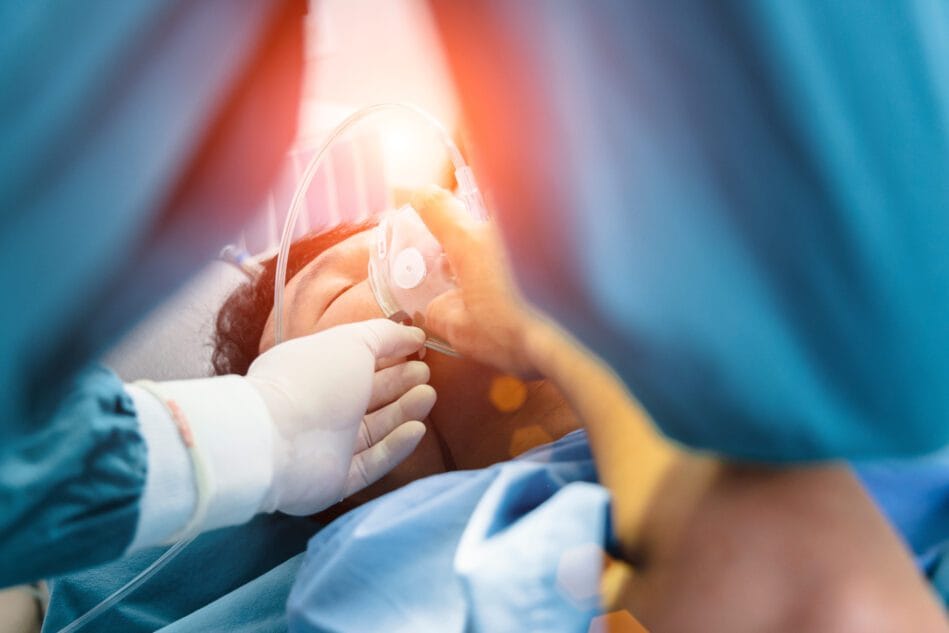When Jenna Bruce was a child, she received what she refers to as “a lot” of anesthesia. More often than not, she’d experience side effects of general anesthesia such as having difficulty urinating for up to 24 hours after and would require temporary hospitalization and catheterization.
Michael Champeau, MD, a pediatrician and anesthesiologist, and president-elect of the American Society of Anesthesiologists, says that difficulty urinating is unusual in children, but is a relatively common side effect of general anesthesia for adults. Over the years, doctors have improved anesthesia administration techniques so side effects, like vomiting and difficulty urinating, have become less common, though some patients do still experience them.
A long-running question, however, remains: Specifically, how does using anesthesia to keep a child unconscious during a procedure or surgery affect the development of their brain? Should you be worried that the drug will damage your child’s brain?
What Is anesthesia? When is it used in children?
There are three main types of anesthesia:
General Anesthesia
This is the type we think of most commonly, which not only numbs pain, but makes a person unconscious. You get it through an IV or you breathe it in through a face mask.
Regional Anesthesia
Regional anesthesia is delivered via injection to the nerves near a particular body part that send pain sensations to the brain. You’ll be awake, but pain will be minimized. An epidural, given to some people while they give birth, is a type of regional anesthesia. Sometimes regional anesthesia and general anesthesia are given together. You can continue to receive regional anesthesia even after surgery.
Local Anesthesia
Local anesthesia can be given as an injection or a cream. It’s often what’s provided during dental work. Creams, such as Aspercreme, which offer some pain relief, are even available over the counter.
Most often, general or regional anesthesia is used during surgeries in which an individual needs to remain immobile and unconscious. The lack of mobility makes the surgery possible, and the lack of consciousness prevents the patient from additional pain and trauma.
While invasive surgeries almost always require anesthesia, there are situations, especially for children, in which anesthesia may be optional or requested, such as a dental procedure in which the child has trouble staying still.
Side Effects of General Anesthesia
As with any drug, severe anaphylactic reactions can be a dangerous side effect.
“Fortunately, those are extremely rare,” says Champeau. He’s been an anesthesiologist for 39 years and has only had three cases. Another rare complication is malignant hyperthermia, in which children develop dangerously high fevers.
More common side effects of general anesthesia include:
Vomiting
o Vomiting has become less common because anesthesias has improved, and doctors may prescribe anti-nausea medicines along with the anesthesia. However, people do still vomit after regaining consciousness. Your child is more likely to experience nausea or vomiting after surgery if she is over 3 years old, if she’s a female who has already gone through puberty, if she has a history of motion sickness or if the surgery lasts more than 30 minutes.
“Wait for the child to ask you for something to eat or drink. I view hunger as being the body telling you that it’s ready to take in food,” says Champeau. “It’s difficult to be nauseous and hungry at the same time.”
Urinary Retention
o Although Bruce described this experience as a child, Champeau says it’s much more typical of adult men.
Confusion
o When they wake up from anesthesia, it can take children’s brains a little while to catch up. Kids can often be “confused, cranky, or combative,” says Champeau.
Sore Throat
o If you had a tube in your mouth during surgery, your throat can often dry out, making it sore.
“It’s very hard to predict who might or might not have these side effects. The good news is these are not life-threatening nor do they harm people in the long term,” he adds of the side effects.
How General Anesthesia Affects Children’s Brains
Some patients and parents fear anesthesia. Despite the fact that doctors have been using it since 1846, we still don’t know how it knocks us out.
“We know a lot about what anesthesia does to the breathing, the blood pressure, and the heart, but how they actually cause unconsciousness is still a bit of a mystery,” says Champeau.
Fear started circling specifically about general anesthesia’s effects on young minds in 2003, when researchers published a study in rodents. When rats received the anesthesia as pups, many of their brain cells died, and they had learning difficulties as they aged.
Champeau says studies like this one showed obvious brain chances in the animals, but also points out that these studies used higher doses of anesthesia than would be used in children.
Additionally, because the animals’ lives are shorter than humans’, the percentage of time they spent under anesthesia covered more of their development. An hour to a rat that typically lives about two years, is not the same as an hour for a child who will still be in early developmental stages at two years.
Since then, researchers have conducted many studies in both animals and humans, with mixed results. Champeau explains that human studies are particularly difficult to draw conclusions from because there are always confounding factors.
If a young child is receiving anesthesia, it’s because they need some type of surgery.
It’s difficult to tell “how much of what you’re seeing—if there is a difference between the groups—is because of the underlying disease, because of the surgery, or whether it’s from the anesthesia,” he says.
In 2016, the Food and Drug Administration (FDA) added a warning that “repeated or lengthy use of general anesthetic and sedation drugs during surgeries or procedures in children younger than 3 years older in pregnant women during their third trimester, may affect the development of the children’s brain.”
They chose three years as a cut off, because Champeau says, “none of the studies have ever shown any difference if the child got their anesthesia older than the age of 3.”
He points to one of the studies he finds most compelling. The researchers looked at 722 children who were born prematurely and needed surgery for a hernia, one of the most common procedures for preterm babies. Half of the infants received general anesthesia for the hour-long surgery, while the other half stayed awake and received regional anesthesia. When they were 5 years old, the children showed no difference in neurological development.
An analysis considering evidence from many studies performed in both humans and animals, published 2022, suggested that few studies have associated general anesthesia in childhood with changes in intelligence, memory, or academic achievement, but there have been some studies that showed differences in attention, behavior, and decision-making.
What You Can Do
Delay procedures until your child is 3 years old, if possible.
Depending on the nature of the procedure your child needs, you can ask your healthcare provider if it’s possible to delay the treatment until he or she is at least three years old. After this point, research suggests that anesthesia is likely safe for the brain.
Ensure that the person administering anesthesia is experienced in working with children.
Children are not just tiny adults. Champeau points out that, when possible, it’s best to request someone who specializes in providing anesthesia to children.
Consider local anesthesia.
Again, depending on the procedure, your child may be eligible for regional anesthesia that won’t affect their brains, rather than general anesthesia. Preterm infants undergoing hernia repairs were slightly less likely to experience apneas after the procedure if they received spinal anesthesia as opposed to general anesthesia, according to a Cochrane Review of seven small trials.






